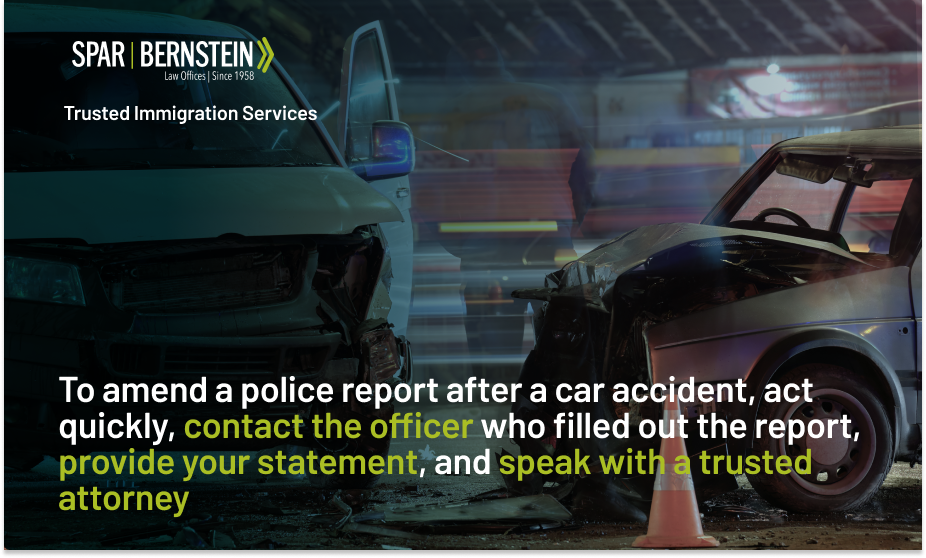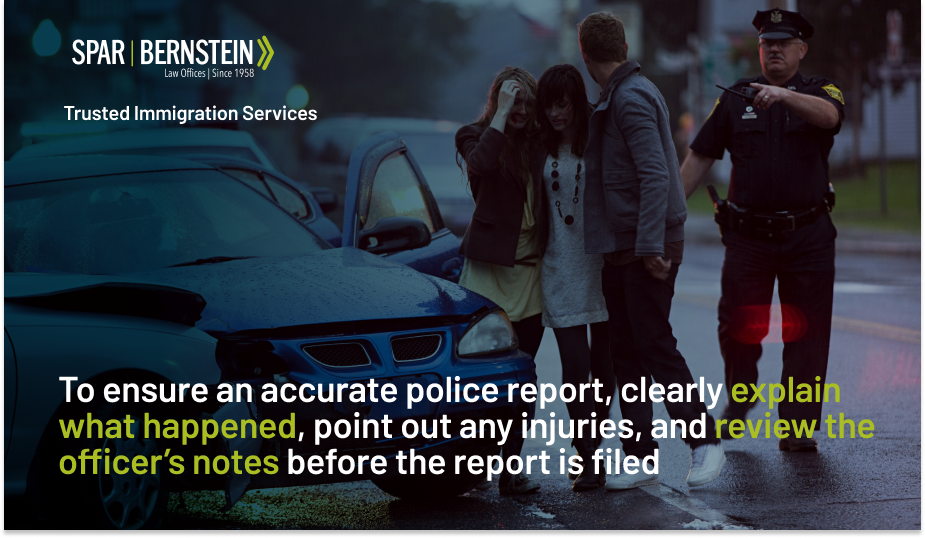

How To Amend A Police Report After A Car Accident: Key Takeaways
- Mistakes in police reports are not uncommon and can refer to factual errors and disputed information
- To amend a police report: act fast, speak to the police office where the report was issued, make a statement, and talk to an experienced attorney
- A police report after a car accident contains important information regarding the parties, vehicles, circumstances, and injuries involved, and it can be key for claiming injury compensation
As an official summary of the parties and circumstances behind a car accident, a police report is an important document used by law enforcement, insurance companies, and lawyers. It helps determine damages, legal responsibility, and compensation.
We’ll cover:
- The common errors that a police report might contain
- The steps you can take to amend inaccuracies
- What a supplement report is
- The information a police report includes
- How to ensure an accurate police report
Types Of Inaccuracies In A Police Report
There are two types of errors to consider in a police report if you’ve been in a car accident.
Factual Errors
Factual errors are relatively easy to amend. They include objective factual inaccuracies referring to:
- Names
- Addresses
- Accident time or location
- Make, model or color of the cars involved in the accident
- License plate numbers
To amend factual errors, submit documentation that clearly shows the error plus the correct information. These might include:
- Your driver’s license
- Your vehicle registration records
- Insurance forms
Correcting factual errors is important because otherwise, the other party’s lawyer may question the validity of the report in an attempt to have their client’s charges reduced or dropped.
Disputed Information
Disputed information is more complicated to amend, especially if the parties involved remember different versions of the car accident.
Disputed information may refer to the way a police officer or a witness described the accident or failure on the police officer’s part to take your statement, perhaps because your condition required urgent transportation to the hospital.
For example, a police report may state that the accident occurred when the light was green, but the driver actually ran a red light. Or the report may state that you were driving at 30 mph while you were actually driving at 20 mph.
Amending disputed information can pose a serious challenge unless you can clearly prove your statement. For example, video evidence from a dash cam could help prove your speed or the color of the traffic light.
If you do not have solid evidence to prove your statement, you can still record your version of events and request that it be attached to the police report as an addendum or a supplemental report.
However, it is entirely up to the police officer to approve or deny your request.
Because of the difficulty involved with amending disputed information, it’s important to partner with an experienced personal injury lawyer you trust.
How To Amend A Police Report After A Car Accident
If you catch an error, don’t wait: it could make a huge difference in your case.
What can you do?
1. Act Fast
After the accident, request a copy of the police report. Check the report for any factual errors or disputed information.
2. Speak To The Police Department That Issued The Report
If you find incorrect information, contact the officer who completed the report. If they are not on duty when you call, inform the front desk officer that you have discovered inaccuracies and would like the report to be amended.
Keep in mind that it may take some time for the police officer on your case to get back to you, as emergency situations are always a priority. Be patient and polite throughout the process.
3. Make A Statement
Provide your version of events, listing facts related to the incorrect information you spotted. Ask the police officer to add your statement to the initial report.
4. Provide Evidence
Depending on the inaccuracy spotted, provide documentation to support your request for an amendment.
For example, let’s say you did not feel injured immediately after the accident, but later on you experienced pain and visited a doctor.
The doctor subsequently diagnosed you with a back and neck injury or a pinched nerve, and you want to make changes to the police report based on your diagnosis.
Bring your diagnosis and any medical notes, anything that backs up what you’re saying. The more solid your evidence, the better your chances.
5. Contact A Trusted Law Firm
The process of amending a police report after an accident can be time-consuming and difficult if the inaccuracies are considered disputed information.
If the police officer does not agree to amend the accident report, you can file a supplemental report describing your version of the circumstances related to the accident.

What Is A Supplemental Report?
A supplemental report after a car accident is an additional report that provides extra information to the original police report.
A supplemental report can be completed by the police officers working on the case or by the party who is pursuing an amendment of disputed information.
A supplemental report can include:
- Testimony by new witnesses
- Information about illegal substances or weapons found near the accident scene at a later stage
- A statement and/or evidence on disputed information
What Details Do Police Reports Include?
A police report is filed by law enforcement in any accident that involves injuries or serious damages.
Although typically inadmissible in court, a police report is among the first things that personal injury lawyers and insurance claim adjusters review after an accident because it helps determine liability.
So, what’s usually in a police report? You’ll find:
- Personal information about the people involved in the accident, such as drivers, passengers, cyclists, or pedestrians
- Accident-related details, such as the date, time, and location of the accident
- A description of injuries suffered by participants in the accident
- A description of damages to vehicles or property
- A description of road and weather conditions
- Any law violations that led to the accident
- Names, contact details, and statements from witnesses
- Photos and diagrams of the accident scene
- A statement about who might be responsible for the accident, in the police officer’s opinion
What You Can Do To Ensure An Accurate Police Report
To minimize the risk of errors in a police report after an accident:
- Check the condition of your passengers, including children, and ask the police officer to add any complaints they may have about possible injuries.
- Take photos and videos of the vehicles, accident scene, and road conditions.
- Check for witnesses who may have been missed.
- Keep an eye on the other driver’s behavior. If they threw away an open beer bottle, for example, ask the police officer to add this fact to the report.
- Check for cameras in the area that may have recorded the accident. You may need this as evidence to amend information in the police report later.

How Spar & Bernstein Can Help You Amend A Police Report
Errors in a police report can affect liability, cause insurance companies to deny your claim, and also affect your chances of receiving fair compensation in a personal injury lawsuit.
At Spar & Bernstein, we’ve been handling personal injury cases for over six decades, from fender benders to serious situations like hit and run, drunk driver, and Uber accidents.
If you believe there is inaccurate information in a police report that was filed after your car accident, our knowledgeable team will:
- Address your concerns and determine if an amendment is possible.
- Collect evidence to support your request.
- Help you prepare and file MV-104, Report of Motor Vehicle Accident.
- Handle your case from start to finish.
- Negotiate with insurance companies and other liable parties to reach a maximum settlement in the event of injuries, damages, or loss.
- Represent you in court if needed.
Schedule a free consultation with our attorneys for expert legal advice and recommended next steps.
Our tenacious attorneys at the Law Offices of Spar & Bernstein will contact the police department to amend the police report in case of errors.
Not sure what to do next? We’ll walk you through it step by step.
How To Amend A Police Report After A Car Accident: FAQs
What if I notice a mistake in the police report days after the accident?
You can still request an amendment, even days or weeks later. Contact the officer who filed the report, explain the error, and provide evidence to back up your request.
Can I amend a police report if I didn’t give my statement at the scene?
Yes, if you were injured or taken to the hospital and unable to give your statement at the scene, you can request to present your version of events so it’s added as a supplemental report.
Could the other driver use the report to shift blame on me?
Yes, and that’s why fixing mistakes fast is key.
Disclaimer: attorney advertisement. prior successful results do not guarantee a similar outcome





